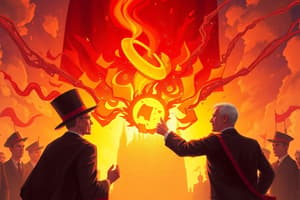Podcast
Questions and Answers
What is a common cause of political defection according to the article?
What is a common cause of political defection according to the article?
What is political defection in the realm of politics?
What is political defection in the realm of politics?
What could be a consequence of political defection mentioned in the article?
What could be a consequence of political defection mentioned in the article?
What is meant by 'presidential rules' as mentioned in the text?
What is meant by 'presidential rules' as mentioned in the text?
Signup and view all the answers
What is personal ambition cited as a reason for in the context of political defection?
What is personal ambition cited as a reason for in the context of political defection?
Signup and view all the answers
Why might a politician pursue the pursuit of power by joining another party?
Why might a politician pursue the pursuit of power by joining another party?
Signup and view all the answers
What is the purpose of implementing presidential term limits?
What is the purpose of implementing presidential term limits?
Signup and view all the answers
What is a potential consequence of political defection?
What is a potential consequence of political defection?
Signup and view all the answers
How can the judiciary check the president's powers?
How can the judiciary check the president's powers?
Signup and view all the answers
What role can the president play in the legislative process?
What role can the president play in the legislative process?
Signup and view all the answers
What is one potential benefit of presidential term limits?
What is one potential benefit of presidential term limits?
Signup and view all the answers
What is a mechanism implemented in a democratic system to prevent the abuse of power by any one branch of government?
What is a mechanism implemented in a democratic system to prevent the abuse of power by any one branch of government?
Signup and view all the answers
How can the president exercise judicial power?
How can the president exercise judicial power?
Signup and view all the answers
What can be a consequence of political defection for a politician?
What can be a consequence of political defection for a politician?
Signup and view all the answers
What is the purpose of checks and balances in a democratic system?
What is the purpose of checks and balances in a democratic system?
Signup and view all the answers
Study Notes
Political Defection and Presidential Rules
In the realm of politics, political defection and presidential rules are two important aspects that shape the dynamics of government and its governance. This article will delve into the causes of political defection, consequences of political defection, presidential powers, checks and balances, and presidential term limits.
Causes of Political Defection
Political defection refers to the act of a political officeholder leaving the political party to which they were formerly affiliated. There are several reasons that can lead to political defection, such as:
- Disagreement with party policies: Political officials may defect due to disagreement with their party's policies, ideologies, or political stances.
- Personal ambition: Some politicians might defect to advance their personal ambitions, such as seeking higher office or gaining more political influence.
- Pursuit of power: Political defectors may join another party with the aim of gaining more power and influence within that party.
Consequences of Political Defection
Political defection can have several consequences, including:
- Loss of political capital: Defecting politicians may lose the political capital they had within their original party, as they will now be seen as outsiders.
- Fracturing political parties: Political defection can lead to the fracturing of political parties, as it creates division and undermines party cohesion.
- Loss of voter support: Defecting politicians may also lose the support of their voters, as the act of defection can be seen as betrayal.
Presidential Powers
The president holds significant powers in a country's political system. These powers can include:
- Executive authority: The president is the head of the executive branch and has the authority to execute laws and policies.
- Legislative power: The president can also play a role in the legislative process, such as vetoing bills passed by Congress.
- Judicial power: The president has the power to appoint judges and justices to the country's highest courts.
Checks and Balances
Checks and balances are mechanisms implemented in a democratic system to prevent the abuse of power by any one branch of government. These mechanisms can include:
- Legislative checks: Congress can check the president's power through measures such as restricting funding for executive branch initiatives and impeachment procedures.
- Judicial checks: The judiciary can check the president through the process of judicial review, where the constitutionality of executive actions is assessed.
- Executive checks: The president can check the powers of Congress and the judiciary through the use of vetoes and the appointment of judges and justices.
Presidential Term Limits
Presidential term limits refer to the number of terms a president can serve in office. These limits can be set by the country's constitution or through legislation. The benefits of presidential term limits can include:
- Preventing the concentration of power: Term limits can prevent the concentration of power in the hands of a single individual or family, ensuring a more diverse pool of leaders.
- Encouraging democratic transitions: Term limits can encourage more frequent democratic transitions, as they limit the length of time a leader can stay in power.
- Promoting political competition: Term limits can promote political competition, as they limit the number of terms a politician can serve, encouraging new leaders to emerge.
In conclusion, political defection, presidential powers, checks and balances, and presidential term limits are all important aspects of a country's political system. Understanding these concepts can help citizens make informed decisions when voting and engaging with their political leaders.
Studying That Suits You
Use AI to generate personalized quizzes and flashcards to suit your learning preferences.
Description
Test your knowledge about political defection, presidential powers, checks and balances, and presidential term limits with this quiz. Explore the causes, consequences, and implications of these crucial aspects of government and governance.




